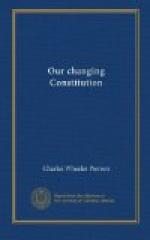Another cause has been the desire to obtain aid in local matters from the national treasury. This has proved an exceedingly potent and insidious influence, leading state officials to surrender voluntarily state prerogatives in exchange for appropriations of federal money. Notable examples of this influence may be found in the field of river and harbor improvements, the creation of various new bureaus in the Department of Commerce, the enormous extension of the activities of the Agricultural Department and the Bureau of Education. The temptation in this direction is particularly strong among the less prosperous states, for it means the expenditure in those states of federal moneys raised chiefly from the taxpayers in wealthier states.
The most potent influence of all, however, has been the matter of internal economic development, stimulated by free trade among the states. This development has gone on apace with little regard for state lines. The invention of railways drew the different sections of the country together in a common growth, and tended to make the barriers interposed by state lines and state laws seem artificial and cumbersome. In fact, they sometimes came to be regarded as intolerable and destructive of progress. The spectacle of men clamoring for federal control of their industries to escape the burdens of a diversified state interference has been a frequent phenomenon of recent years.[1]
[Footnote 1: See e.g. the efforts of the life insurance interests: N.Y. Life Ins. Co. v. Deer Lodge County, 231 U.S., 495.]
The foregoing enumeration by no means covers all the forces which have been at work. In recent years a strong tendency toward centralization and combination has developed, a tendency pervading all the interests and activities of men. Moreover, new views have arisen concerning the functions and scope of government, views challenging the laissez faire doctrines of earlier days and demanding a greater measure of governmental interference with the affairs of the individual. These tendencies, however, are not peculiar to America and lie outside the scope of the present discussion.
In considering the methods by which the change of spirit toward the Constitution has been put into effect, one is struck by the comparatively small part played by the only method contemplated by the framers, viz., constitutional amendment. This method is entirely practicable and fairly expeditious provided a sufficient number favor the change proposed. In the one hundred years prior to the recent Income Tax Amendment, however, only three amendments were enacted (Numbers XIII, XIV, and XV), all of them dealing primarily with the abolition of slavery and the civil rights of the Negro. The only one which need be noticed here is Number XIV, which substituted a federal test of citizenship for state tests and provided that no state should “deprive any person of life, liberty,




